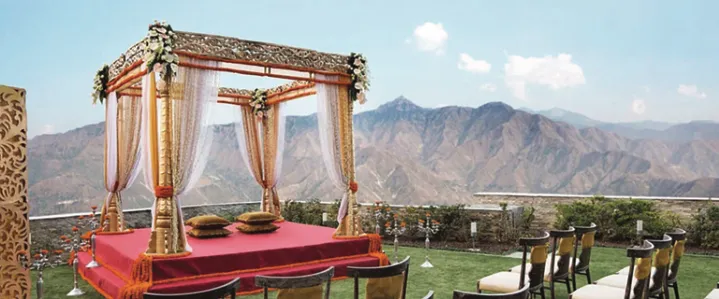A silent crisis is unfolding in Kashmir, one that does not receive the urgency it deserves. Late marriages, once an exception, have now become the norm, bringing with them emotional distress, societal discontent, and moral challenges. Marriage, which was meant to be a source of stability and companionship, has turned into an exhausting financial burden dictated by extravagant societal expectations.
What was once a sacred and simple union is now buried under unnecessary obligations that have no foundation in faith or rationality. This shift is not just a personal concern but a deep-rooted societal issue affecting family structures and the future of the community.One of the primary reasons for delayed marriages is the overwhelming financial burden that accompanies weddings.

The pressure to host grand feasts, exchange expensive gifts, and meet excessive demands has turned a straightforward religious practice into an event of heavy spending. In many cases, families are forced to take loans or deplete lifelong savings simply to meet societal expectations. The bride’s family, in particular, bears an unjust share of this burden, expected to provide dowry in the form of lavish gifts, extravagant wedding ceremonies, and financial favours.
This has no basis in Islamic teachings, which emphasise ease and simplicity in marriage. The Prophet Muhammad (peace be upon him) advocated for marriages that are accessible and free from undue hardship. His daughter Fatimah’s (RA) marriage to Imam Ali (RA) was conducted with minimal material expectations, proving that the true essence of marriage lies in companionship and mutual understanding rather than financial transactions.
At the same time, grooms’ families also face mounting expectations. Many young men are pressured to establish significant financial stability before even considering marriage. They are expected to secure property, a well-paying job, and meet a list of social prerequisites before being deemed suitable.
While financial responsibility is important, the extreme demands placed on young men are leading to unnecessary delays. In Islam, the emphasis has always been on a man’s character, faith, and commitment rather than his wealth. Yet, modern Kashmiri society has made economic status a primary criterion, resulting in prolonged bachelorhood, unfulfilled aspirations, and rising levels of anxiety among the youth.
The issue of Mahr (dower) has also contributed to these delays. While Islam grants women the right to set their Mahr, it encourages moderation. The Quran states, “And if you have given one of them a great amount (qintāran) as Mahr, take not the least bit of it back” (Surah An-Nisa 4:20).
This affirms that Mahr is a bride’s undisputed right. However, it should not be misinterpreted as a justification for excessive demands that make marriage difficult. The Prophet (peace be upon him) emphasized that the best marriage is the one that is easiest, highlighting the importance of making Nikah accessible rather than burdensome.
During his caliphate, Umar ibn Al-Khattab (RA) attempted to restrict excessive Mahr, fearing it was making marriage difficult. When a woman challenged him by citing the Quran, he retracted his stance, showing that while Mahr should not be capped, it should remain reasonable and fair.The marriage of Fatimah (RA) and Imam Ali (RA) serves as an example of moderation, where the Mahr was simple and did not place a financial strain on either family.
If such an approach was upheld by the Prophet’s own family, then why should today’s marriages be dictated by unrealistic expectations?Beyond financial strains, another growing concern is the increasing fear of domestic issues post-marriage. Families, particularly those of brides, are apprehensive about the security and well-being of their daughters. Reports of mistreatment, financial exploitation, and even domestic violence have created a deep sense of distrust.
Many parents hesitate to marry off their daughters, fearing that they might be subjected to unreasonable demands, emotional neglect, or physical harm. In many cases, the concept of dowry—despite being outright rejected by Islam—has fostered an unhealthy dynamic where brides are seen as financial contributors rather than equal partners in marriage. This erosion of ethical values has fueled distrust, causing families to prolong the marriage process in search of an ideal match who will not subject their daughters to undue hardship.
In addition to societal pressures, there is also a widespread belief that marriage conflicts with education and career aspirations. Many young men and women delay marriage, believing that it will hinder their professional growth. However, this mindset is deeply flawed and has led to unintended consequences.
Marriage does not obstruct education or ambition; rather, it provides emotional support, stability, and a structured environment in which individuals can thrive. Delaying marriage under the impression that it will allow for greater professional success often results in individuals struggling to adjust later in life. Years of independence make adaptation to a shared life more challenging, leading to increased marital conflicts and dissatisfaction.
This delay has also led to moral dilemmas, as prolonged singleness exposes individuals to distractions and behaviours that contradict ethical and religious values.The consequences of delayed marriages extend far beyond the individuals involved. Psychological distress is one of the most immediate effects, with many experiencing anxiety, loneliness, and an overarching sense of incompleteness.
As societal pressure mounts, individuals in their late twenties and thirties begin to feel left behind, struggling with self-doubt and emotional turmoil. Women, in particular, face intense scrutiny over their age and marital status, leading to unnecessary insecurity. Men, too, face emotional distress as they are often expected to meet unattainable financial benchmarks before considering marriage.
These pressures take a toll on mental well-being, leaving many to question their self-worth and prospects for the future.There is also a significant moral and ethical decline resulting from delayed marriages. Prolonged singleness has normalised relationships outside marriage, leading to increased emotional attachments, distractions, and, in some cases, behaviours that are frowned upon in a society that upholds moral and ethical values.
Social media, changing cultural influences, and exposure to external ideals have contributed to this shift. The longer marriages are delayed, the greater the risk of people engaging in interactions that would have otherwise been prevented within the secure structure of a marriage. This, in turn, weakens the foundation of modesty and ethical values in society.
Another consequence of late marriages is the disruption of family structures and declining fertility rates. As individuals marry later, they have fewer years to build and nurture a strong marital bond, making adjustments and compromises more difficult. Women who marry late often face challenges in conception, leading to medical complications, emotional distress, and increased reliance on medical interventions.
Additionally, a wider age gap between parents and children leads to generational disconnect, making it harder to establish close familial bonds. These long-term consequences impact not just individuals but also the future stability of the community.The delay in marriage also has an economic impact.
With individuals prioritizing financial success and consumerism over family life, society is shifting towards a culture of individualism rather than communal well-being. The economy thrives on self-indulgence, luxury lifestyles, and personal achievements rather than collective stability. The rising costs of marriage only add to the perception that marriage is an elite privilege rather than a natural step in life.
This cycle continues as young people, seeing marriage as an unaffordable milestone, push it further down their list of priorities.The growing trend of late marriages is not just a minor social shift but a pressing crisis that demands urgent reform. A fundamental shift in societal attitudes is necessary to restore balance.
The concept of marriage must be freed from materialistic expectations and financial burdens. It is essential to return to the Islamic principles of simplicity, fairness, and mutual support. The idea that marriage must be extravagant, expensive, or perfectly timed according to financial milestones must be abandoned.
Parents, religious scholars, and community leaders have a crucial role in driving this change. The responsibility lies not only with the individuals seeking marriage but also with families who impose unnecessary conditions. Parents must realise that delaying marriage in pursuit of financial security often does more harm than good.
Religious scholars must use their platforms to advocate for accessible, simple marriages rather than reinforcing cultural customs that make marriage unattainable for many. Community leaders must take active steps in educating families on the long-term consequences of unnecessary delays. The focus should shift from status-driven marriages to those rooted in mutual respect, compatibility, and shared values.
The urgency of this issue cannot be overstated. If the trend of delayed marriages continues, the consequences will be long-lasting, leading to weaker family structures, declining ethical values, and rising mental health struggles. The solution is not to delay marriage but to make it easier.
By dismantling unrealistic societal expectations and returning to the true essence of marriage, society can rebuild itself in a way that nurtures both individuals and the community at large.The time for reform is now. If society fails to act, the institution of marriage will lose its sanctity – a pillar of stability and fulfillment, family structures will collapse, and ethical values will fade.
Preserving marriage is not just about tradition—it is about safeguarding the foundation of future generations.Malik Daniyal is pursuing Bachelor’s at the University of DelhiThe post The growing concern of late marriages in Kashmir appeared first on Greater Kashmir..
Politics

The growing concern of late marriages in Kashmir

Marriage, a source of stability and companionship, has turned into an exhausting financial burden dictated by extravagant societal expectationsThe post The growing concern of late marriages in Kashmir appeared first on Greater Kashmir.














